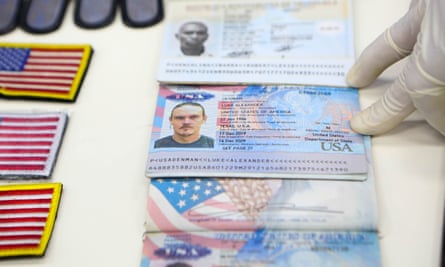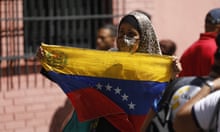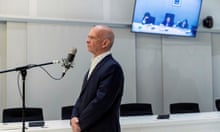Donald Trump has denied any involvement by the US government in what Venezuelan officials have called a failed armed incursion in the South American country that led to the capture of two American “mercenaries”.
The president made the comment to reporters at the White House after Venezuela’s president, Nicolás Maduro, announced that authorities there had detained two US citizens working with a US military veteran who has claimed responsibility for the foiled operation.
“We’ll find out. We just heard about it,” Trump said when asked about the incident and the Americans’ arrests. “But it has nothing to do with our government.”
In a televised address, Maduro said authorities arrested 13 “terrorists” on Monday involved in what he described as a plot coordinated with Washington to enter the country via the Caribbean coast and oust him.
Eight people were killed during the incursion attempt on Sunday, Venezuelan authorities said.
Maduro showed what he said were the US passports and other identification cards belonging to Airan Berry and Luke Denman, whom he said were in custody and had been working with Jordan Goudreau, an American military veteran who leads a Florida-based security company called Silvercorp USA.
The two detained Americans, former special operations forces members who had served with Goudreau, were believed to be in the custody of Venezuelan military intelligence, according to a person familiar with the matter.
Washington has waged a campaign of economic sanctions and diplomatic measures against Venezuela in an effort to oust Maduro, accusing him of having rigged elections in 2018.
But while Trump has repeatedly said all options are on the table, his administration has shown no apparent interest in military action as it pursues what it calls a “maximum pressure” strategy against Maduro.

Maduro’s government, however, says the United States wants to control the Opec member nation’s massive oil reserves.
Since early 2019, the United States and dozens of other countries have recognized the opposition leader Juan Guaidó as the legitimate interim president.
But Maduro remains in power, backed by the military as well as Russia, Cuba and China, which some US officials say privately is a source of frustration for Trump.
Guaidó insisted that Maduro was seeking to distract from other problems in recent days, including a deadly prison riot and a violent days-long gang battle in Caracas, the capital.
Adding to the chaos, a blackout swept through parts of the country on Tuesday afternoon, leaving areas in 17 of the country’s 23 states without electricity.
NetBlocks, an internet observatory, reported that national connectivity was down to about 60% of ordinary levels. Widespread power outages – increasingly a mainstay of Venezuelan life – have been attributed to years of corrupt mismanagement of the energy sector.
David Smilde, a Venezuela analyst at the Washington Office on Latin America, said he suspected that while the planned incursion into the country was probably the work of freelancing mercenaries, their plan may have been motivated by misguided and cavalier US policy.
“Put a $15m reward on Nicolás Maduro like we are in the wild west and you can pretty much count on some people acting like cowboys,” said Smilde in reference to indictments leveled at Maduro and his cronies.
“In the end this has strengthened the Maduro government in its efforts to look invincible, and has undermined the Guaidó government’s efforts to look legitimate and competent,” said Smilde.
Mike Vigil, the former head of international operations for the Drug Enforcement Administration, said to the AP: “It shocks me how insane they were. They walked right into a coiled rattlesnake without even having minimally studied the capacity of the Venezuelan armed forces.”
Vanessa Neumann, Guaidó’s envoy to the UK, denied any links with the failed incursion, but raised fears for the captured Americans.
“It is deeply unfortunate that they will become bargaining chips for the Maduro regime,” the diplomat said. “And that they will suffer the same awful conditions that Venezuelan prisoners also face, in crumbling jails with no healthcare during a pandemic,” Neumann said.
Reuters and the Associated Press contributed reporting








